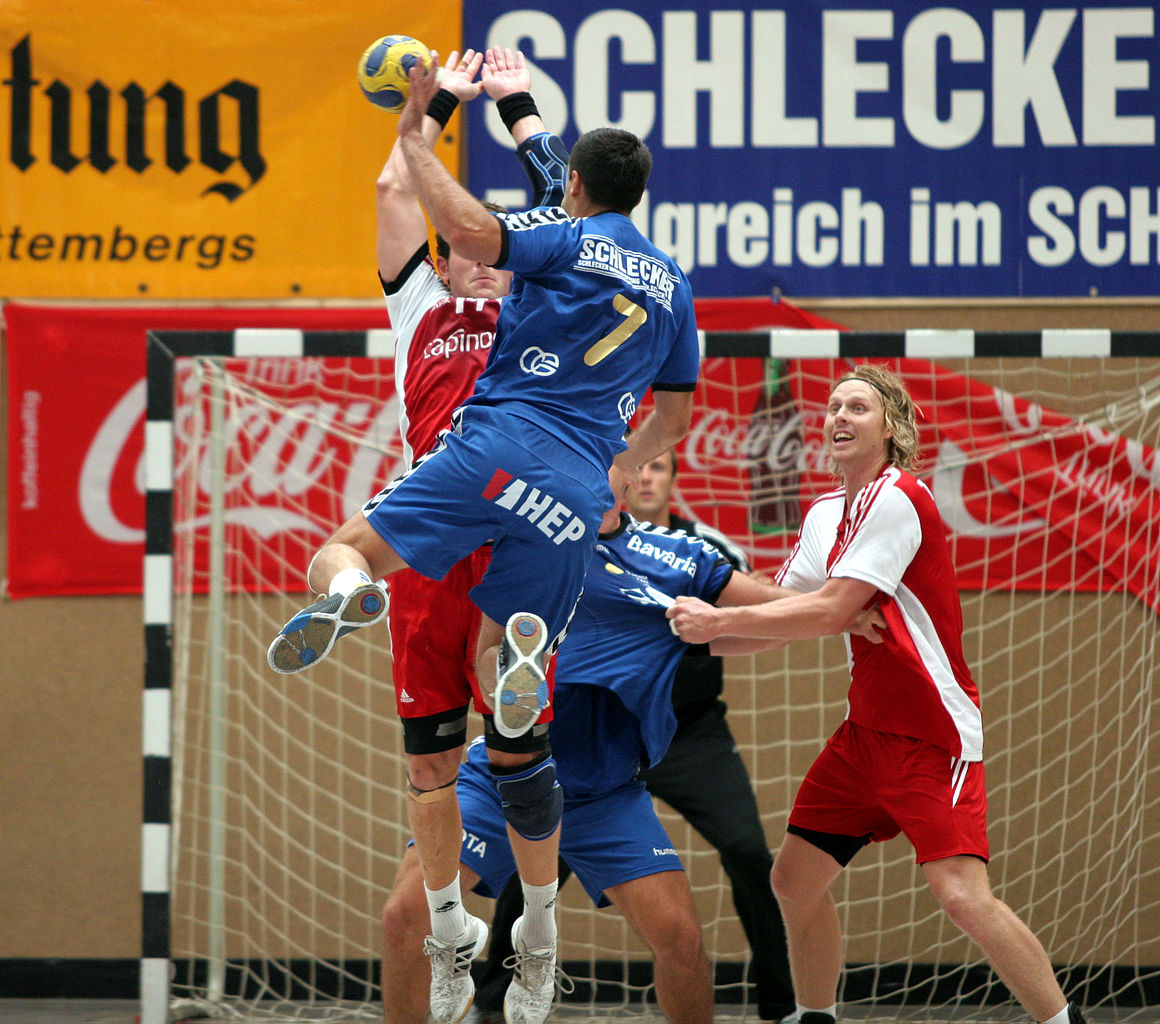Análise Situacional e Tomada de Decisão Tática por Jogadores de Handebol de Elite

|
OPEN ACCESS: Artigo disponível/Article available/Artículo disponible - ASSINANTE/SUBSCRIBER: Artigo para Assinante do periódico/Article for Journal Subscriber/Artículo para suscriptores de este periódico - PAY-PER-VIEW: Compre o artigo e leia/Buy the article and read/Compra el artículo y lee - IMAGE: Photographer: Armin Kübelbeck, CC BY-SA 3.0, Wikimedia Commons |
Palavras-chave:
Handebol, Precisão, Correção Técnica, Oclusão Temporal, ProbabilidadeResumo
A análise situacional e a tomada de decisões representam elementos-chave do desempenho esportivo de elite, mas poucos estudos investigaram quais habilidades do jogador relacionadas a esses aspectos são relevantes em handebolistas de elite. O objetivo deste estudo foi abordar diferenças entre handebolistas pertencentes a dois níveis no processamento de informações de probabilidades situacionais relacionadas a situações ofensivas e defensivas. Um total de 38 handebolistas (masculino = 22, feminino = 16, idade: 25,6 ± 6,5 anos, primeiro nível = 11, segundo nível = 27) assistiram a vídeos sobre diferentes ações ofensivas e defensivas. De acordo com o paradigma da oclusão temporal, cada handebolista forneceu uma resposta sobre a melhor ação que um jogador selecionado deveria realizar de acordo com o contexto do jogo. O tempo, a precisão e a correção técnica da resposta de cada jogador foram avaliados. MANOVA revelou diferenças de habilidades moderadas a altas entre jogadores de primeiro e segundo nível. Os jogadores de primeira linha forneceram pontuações mais altas em tempo de resposta e precisão; eles também obtiveram pontuações mais altas de acerto técnico na situação mais complexa. Os membros do primeiro nível pareciam depender principalmente da precisão das respostas, mesmo que a correção técnica também resultasse num preditor na situação mais complexa. Jogar no melhor nível parece exigir o desenvolvimento de habilidades muito boas relacionadas ao processamento de informações de probabilidade situacional; portanto, treinar esses elementos parece ser necessário para determinar as diferenças entre os handebolistas de elite.
ARK
— Identificador persistente da Edição 2023 OLYMPIKA MAGAZINE - VOLUME 1 ONLINE - Nº. 001: https://n2t.net/ark:/40019/oly.v1i1
— Identificador persistente deste artigo: https://n2t.net/ark:/40019/oly.v1i1.4.g10
Referências
(1) Davids K, Araújo D, Correia V, Vilar L. How Small-Sided and Conditioned Games Enhance Acquisition of Movement and Decision-Making Skills. Exercise and Sport Sciences Reviews. 2013 Jul;41(3):154–61.
(2) Allard F, Burnett N. Skill in Sport. Can. J. Psychol. Rev. Can. Psychol. 1985; 39, 294–312.
(3) Silva AF, Conte D, Clemente FM. Decision-Making in Youth Team-Sports Players: A Systematic Review. International Journal of Environmental Research and Public Health. 2020 May 27;17(11):3803.
(4) Barraclough AS, Till K, Kerr A, Emmonds S. Methodological Approaches to Talent Identification in Team Sports: A Narrative Review. Sports. 2022 May 24;10(6):81.
(5) Harper DJ, Carling C, Kiely J. High-Intensity Acceleration and Deceleration Demands in Elite Team Sports Competitive Match Play: A Systematic Review and Meta-Analysis of Observational Studies. Sports Medicine. 2019 Sep 10;49(12).
(6) Petway AJ, Freitas TT, Calleja-González J, Medina Leal D, Alcaraz PE. Training load and match-play demands in basketball based on competition level: A systematic review. Balsalobre-Fernández C, editor. PLOS ONE. 2020 Mar 5;15(3):e0229212.
(7) Vickers JN. Perception, Cognition, and Decision Training: The Quiet Eye in Action; Human Kinetics: Champaign, IL, USA, 2007.
(8) Nicolosi S. Strategie didattiche per l’educazione motoria. Milano: Franco Angeli Editore, Cop; 2015.
(9) Müller S, Gurisik Y, Hecimovich M, Harbaugh AG, Vallence AM. Individual Differences in Short-Term Anticipation Training for High-Speed Interceptive Skill. Journal of Motor Learning and Development. 2017 Jun;5(1):160–76.
(10) Williams AM, Jackson RC. Anticipation in sport: Fifty years on, what have we learned and what research still needs to be undertaken? Psychology of Sport and Exercise. 2019 May;42:16–24.
(11) Tenenbaum G, Eklund RC. Handbook of Sport Psychology. John Wiley & Sons; 2007.
(12) Farrow D, Reid M. The contribution of situational probability information to anticipatory skill. Journal of Science and Medicine in Sport. 2012 Jul;15(4):368–73.
(13) A Mark Williams, Davids K, Williams JGP. Visual perception and action in sport. London: Taylor & Franics; 2008.
(14) Bar-Eli M, Henning Plessner, Raab M, Ebrary I. Judgement, decision making and success in sport. Malden, Mass.: Wiley; 2011.
(15) Johnson JG, Raab M. Take The First: Option-generation and resulting choices. Organizational Behavior and Human Decision Processes. 2003 Jul;91(2):215–29.
(16) Raab M. Simple heuristics in sports. International Review of Sport and Exercise Psychology. 2012 Sep;5(2):104–20.
(17) Bonnet G, Debanne T, Laffaye G. Toward a better theoretical and practical understanding of field players’ decision-making in handball: A systematic review. Movement & Sport Sciences - Science & Motricité. 2020;(110):1–19.
(18) Hinz M, Lehmann N, Musculus L. Elite Players Invest Additional Time for Making Better Embodied Choices. Frontiers in Psychology. 2022 Jun 6;13.
(19) Schmidt RA, Timothy Donald Lee, Winstein CJ, Wulf G, Zelaznik HN. Motor control and learning : a behavioral emphasis. Champaign, Il: Human Kinetics; 2019.
(20) Johnson JG. Cognitive modeling of decision making in sports. Psychology of Sport and Exercise. 2006 Nov;7(6):631–52.
(21) Mann DTY, Williams AM, Ward P, Janelle CM. Perceptual-Cognitive Expertise in Sport: A Meta-Analysis. Journal of Sport and Exercise Psychology. 2007 Aug;29(4):457–78.
(22) Hinz M, Lehmann N, Melcher K, Aye N, Vanja Radić, Wagner H, et al. Reliability of Perceptual-Cognitive Skills in a Complex, Laboratory-Based Team-Sport Setting. Applied sciences. 2021 Jun 3;11(11):5203–3.
(23) Milazzo N, Farrow D, Ruffault A, Fournier JF. Do karate fighters use situational probability information to improve decision-making performance during on-mat tasks? Journal of Sports Sciences. 2015 Dec 14;34(16):1547–56.
(24) Biscaia P, Coelho E, Antonio Hernández Mendo, Alves J. Processamento da informação e antecipação em jogadoras de andebol de elite: Da formação ao alto nível: da formação ao alto nível. Revista Iberoamericana de Psicología del Ejercicio y el Deporte. 2018 Jan 1;13(2):179–91.
(25) Robertson K, De Waelle S, Deconinck FJ, Lenoir M. Differences in expertise level for anticipatory skill between badminton “in game” strokes and serves. International Journal of Sports Science & Coaching. 2021 Nov 14;174795412110469.
(26) Hodges NJ, Huys R, Starkes JL. Methodological Review and Evaluation of Research in Expert Performance in Sport. In Handbook of Sport Psychology; Tenenbaum, G., Eklund, R.C., Eds.; Wiley: New York, NY, USA, 2007; pp. 159–183.
(27) Araújo D, Hristovski R, Seifert L, Carvalho J, Davids K. Ecological cognition: expert decision-making behaviour in sport. International Review of Sport and Exercise Psychology. 2017 Jul 9;12(1):1–25.
(28) McAuley ABT, Baker J, Kelly AL. Defining “elite” status in sport: from chaos to clarity. German Journal of Exercise and Sport Research. 2021 Aug 5;
(29) Baker J, Farrow D. Routledge handbook of sport expertise. London ; New York: Routledge; 2015.
(30) Farrow D, Baker J, Macmahon C. Developing sport expertise : researchers and coaches put theory into practice. London: Routledge; 2007.
(31) Ward P, Ericsson KA, Williams AM. Complex Perceptual-Cognitive Expertise in a Simulated Task Environment. Journal of Cognitive Engineering and Decision Making. 2012 Oct 3;7(3):231–54.
(32) Powless MD, Steinfeldt JA, Fisher SE, McFadden P, Kennedy KW, Bellini S. Utilizing Video-Based Trainings to Improve Decision Making in High School Quarterbacks. Sports. 2020 Feb 6;8(2):18.
(33) Wiman M, Salmoni AW, Hall CR. An Examination of the Definition and Development of Expert Coaching. Int. J. Coach. Sci. 2010; 4, 37–60.
(34) Koopmann T, Faber I, Baker J, Schorer J. Assessing Technical Skills in Talented Youth Athletes: A Systematic Review. Sports Medicine. 2020 Jun 3; 50, 1593–1611.
(35) Cohen J. Statistical Power Analysis for the Behavioral Sciences. Routledge: London, UK, 2013.
(36) Hoffman RR, Hancock PA, Scerbo MW, Raja Parasuraman, Szalma JL. The Cambridge Handbook of Applied Perception Research. Cambridge University Press; 2015.
(37) Ward P, Suss J, Eccles DW, Williams AM, Harris KR. Skill-based differences in option generation in a complex task: a verbal protocol analysis. Cognitive Processing. 2011 Apr 2;12(3):289–300.
(38) Ward P, Williams AM. Perceptual and Cognitive Skill Development in Soccer: The Multidimensional Nature of Expert Performance. Journal of Sport and Exercise Psychology. 2003 Mar;25(1):93–111.
(39) Ward P, Suss J, Itay Basevitch. Expertise and Expert Performance-Based Training (ExPerT) in Complex Domains. 2009 Mar 1;7(2):121–45.
(40) Sohn YW, Doane SM. Memory Processes of Flight Situation Awareness: Interactive Roles of Working Memory Capacity, Long-Term Working Memory, and Expertise. Human Factors: The Journal of the Human Factors and Ergonomics Society. 2004 Sep;46(3):461–75.
(41) Sohn YW, Doane SM. Roles of working memory capacity and long-term working memory skill in complex task performance. Memory & Cognition. 2003 Apr;31(3):458–66.
(42) Klein M. The Recognition-Primed Decision (RPD) Model: Looking Back, Looking Forward. In Naturalistic Decision Making; Psychology Press: New York, NY, USA, 1997; p. 440.
(43) Raab M, Johnson JG. Expertise-based differences in search and option-generation strategies. Journal of Experimental Psychology: Applied. 2007;13(3):158–70.
(44) Buszard T. On Learning to Anticipate in Youth Sport. Sports Medicine. 2022 May 27; 52, 2303–2314.
(45) Taleb, N.N. (Anti) Fragility and Convex Responses in Medicine. In Unifying Themes in Complex Systems IX; Morales, A.J., Gershenson, C., Braha, D., Minai, A.A., Bar-Yam, Y., Eds.; Springer Proceedings in Complexity; Springer International Publishing: Cham, Switzerland, 2018; pp. 299–325.
(46) Bonini N, Fabio Del Missier, Rino Rumiati. Psicologia del giudizio e della decisione. 2008.
(47) K Anders Ericsson, Smith J. Toward a general theory of expertise : prospects and limits. Cambridge ; New York: Cambridge University Press; 1991.
(48) Gabbett T, Rubinoff M, Thorburn L, Farrow D. Testing and Training Anticipation Skills in Softball Fielders. International Journal of Sports Science & Coaching. 2007 Mar;2(1):15–24.
(49) Hopwood MJ, Mann DL, Farrow D, Nielsen T. Does Visual-Perceptual Training Augment the Fielding Performance of Skilled Cricketers? International Journal of Sports Science & Coaching. 2011 Dec;6(4):523–35.
(50) Smeeton NJ, Williams AM, Hodges NJ, Ward P. The Relative Effectiveness of Various Instructional Approaches in Developing Anticipation Skill. Journal of Experimental Psychology: Applied. 2005;11(2):98–110.
(51)Williams AM, Ward P, Knowles JM, Smeeton NJ. Anticipation skill in a real-world task: Measurement, training, and transfer in tennis. Journal of Experimental Psychology: Applied. 2002;8(4):259–70.
OBS:
Artigo adaptado e traduzido para o português pelos editores de OLYMPIKA MAGAZINE para republicação, conforme normas de submissão do periódico. Versão original em: https://www.mdpi.com/2076-3417/13/15/8920 LICENÇA ORIGINAL E DA ADAPTAÇÃO: © 2023 by the authors https://creativecommons.org/licenses/by/4.0/.
Imagem meramente ilustrativa. Fonte: Photographer: Armin Kübelbeck, CC BY-SA 3.0, Wikimedia Commons
Publicado
Como Citar
Edição
Secção
ARK
Licença
Direitos de Autor (c) 2023 Simona Nicolosi, Antonella Quinto, Mario Lipoma

Este trabalho encontra-se publicado com a Licença Internacional Creative Commons Atribuição 4.0.






